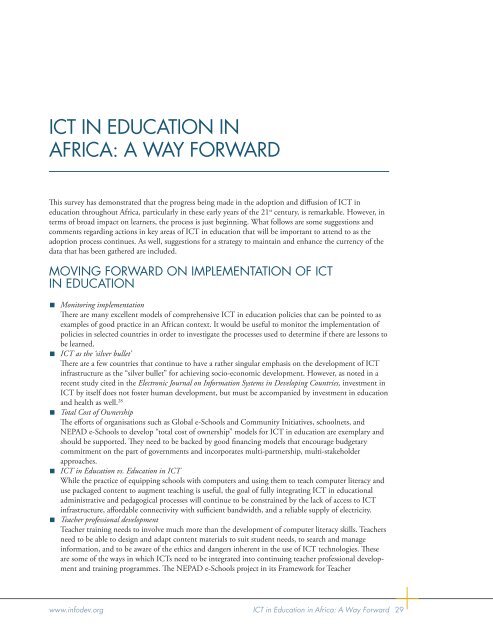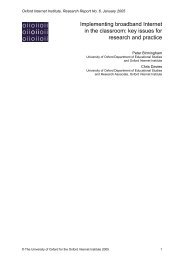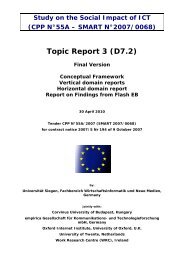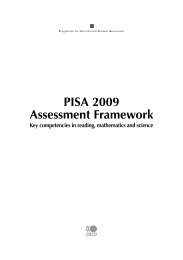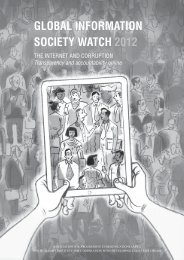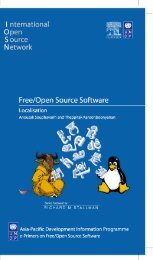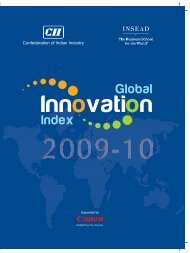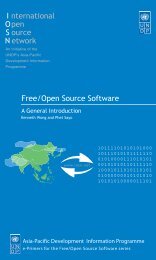SURVEY OF ICT AND EDUCATION IN AFRICA - infoDev
SURVEY OF ICT AND EDUCATION IN AFRICA - infoDev
SURVEY OF ICT AND EDUCATION IN AFRICA - infoDev
- No tags were found...
Create successful ePaper yourself
Turn your PDF publications into a flip-book with our unique Google optimized e-Paper software.
<strong>ICT</strong> in Education in<strong>AFRICA</strong>: A Way ForwardThis survey has demonstrated that the progress being made in the adoption and diffusion of <strong>ICT</strong> ineducation throughout Africa, particularly in these early years of the 21 st century, is remarkable. However, interms of broad impact on learners, the process is just beginning. What follows are some suggestions andcomments regarding actions in key areas of <strong>ICT</strong> in education that will be important to attend to as theadoption process continues. As well, suggestions for a strategy to maintain and enhance the currency of thedata that has been gathered are included.Moving Forward on Implementation of <strong>ICT</strong>in EducationnnnnnMonitoring implementationThere are many excellent models of comprehensive <strong>ICT</strong> in education policies that can be pointed to asexamples of good practice in an African context. It would be useful to monitor the implementation ofpolicies in selected countries in order to investigate the processes used to determine if there are lessons tobe learned.<strong>ICT</strong> as the ‘silver bullet’There are a few countries that continue to have a rather singular emphasis on the development of <strong>ICT</strong>infrastructure as the “silver bullet” for achieving socio-economic development. However, as noted in arecent study cited in the Electronic Journal on Information Systems in Developing Countries, investment in<strong>ICT</strong> by itself does not foster human development, but must be accompanied by investment in educationand health as well. 28Total Cost of OwnershipThe efforts of organisations such as Global e-Schools and Community Initiatives, schoolnets, andNEPAD e-Schools to develop “total cost of ownership” models for <strong>ICT</strong> in education are exemplary andshould be supported. They need to be backed by good financing models that encourage budgetarycommitment on the part of governments and incorporates multi-partnership, multi-stakeholderapproaches.<strong>ICT</strong> in Education vs. Education in <strong>ICT</strong>While the practice of equipping schools with computers and using them to teach computer literacy anduse packaged content to augment teaching is useful, the goal of fully integrating <strong>ICT</strong> in educationaladministrative and pedagogical processes will continue to be constrained by the lack of access to <strong>ICT</strong>infrastructure, affordable connectivity with sufficient bandwidth, and a reliable supply of electricity.Teacher professional developmentTeacher training needs to involve much more than the development of computer literacy skills. Teachersneed to be able to design and adapt content materials to suit student needs, to search and manageinformation, and to be aware of the ethics and dangers inherent in the use of <strong>ICT</strong> technologies. Theseare some of the ways in which <strong>ICT</strong>s need to be integrated into continuing teacher professional developmentand training programmes. The NEPAD e-Schools project in its Framework for Teacherwww.infodev.org <strong>ICT</strong> in Education in Africa: A Way Forward 29


